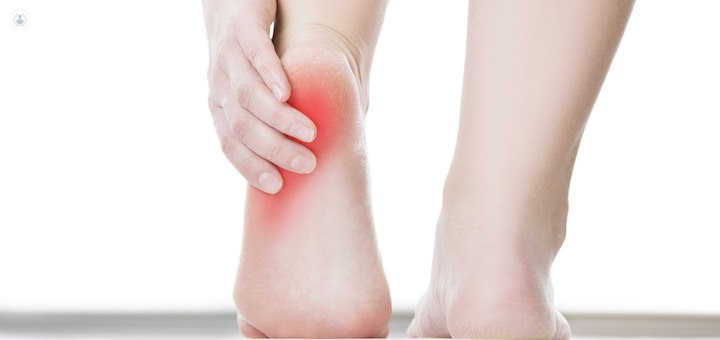Why does my heel hurt so much? A brief guide to heel pain
Written in association with:Do you have an ache or pain in your heel that just won’t go away? Expert orthopaedic surgeon Paul Hamilton provides all the answers:

Heel pain is a common complaint that can significantly affect quality of life. It can mean you can’t run or do sports, and can even make day-to-day mobility more difficult. Ensuring the correct diagnosis is the key to implementing an accurate and individualised management plan.
Heel pain – fast facts
- The two main conditions causing heel pain are plantar fasciitis and Achilles tendinopathy.
- The cause is often unknown but may result from training errors, being overweight, an abnormal foot shape or a tight calf.
- In the chronic form, the condition can go on for many months and occasionally years.
- Accurate and early diagnosis can prevent it from becoming chronic and shorten the time you have the condition.
- Treatment options include
- Physiotherapy
- Insoles
- Injections
- Extra-corporeal shockwave therapy
- Calf stretching operations
How does heel pain occur?
The exact causes of heel pain are unknown but the process probably relates to increased or abnormal loading of the Achilles tendon or the plantar fascia (a band of fibrous tissue on the bottom of the foot, running from the heel to the toes), leading to degeneration. If this isn’t resolved quickly, the condition can become chronic and it often lasts for many months.
Heel pain is associated with a sudden increase in activities, being overweight, a flat or high-arched foot, or a tight calf muscle. It is also associated with some generalised conditions such as rheumatoid arthritis and occasionally medication.
What is heel pain?
There are two main conditions associated with heel pain: Achilles tendinopathy (this can refer to tendinitis or tendinosis), and plantar fasciitis. Click here to learn more about these conditions:
Achilles tendinopathy plantar fasciitis


Read Paul Hamilton’s guide to heel pain treatment here.
If you are experiencing heel pain, consult your doctor or a specialist.


